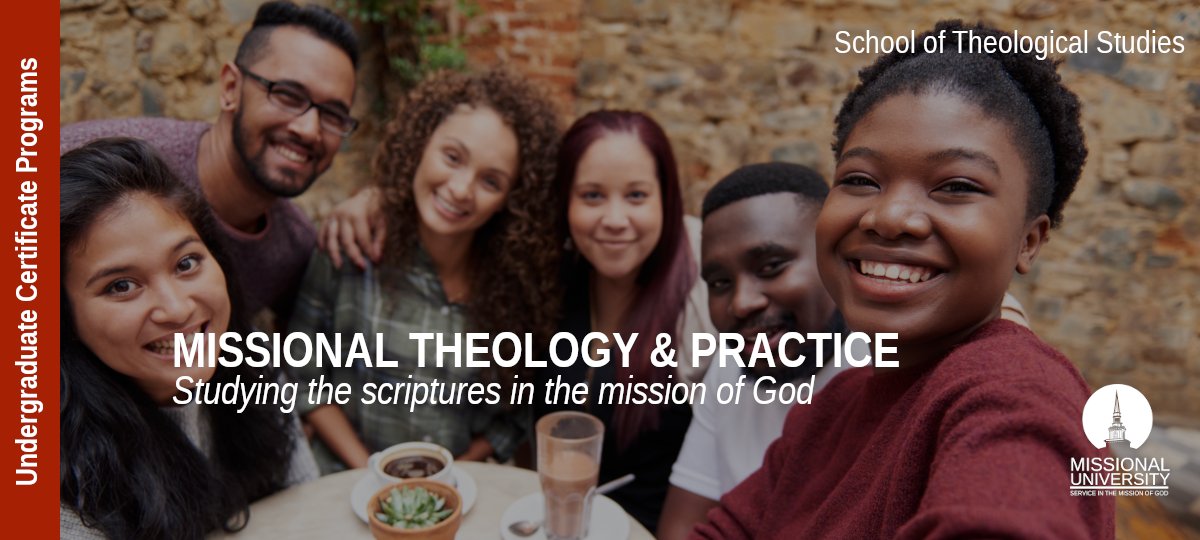
Online Undergraduate Certificate in
Missional Theology & Practice
⚜ Rarely Offered in Christian Universities, Bible Colleges or Seminaries
Expand Your Missional Service Today!
REQUEST INFORMATION
Ready to learn more about the
Undergraduate Certificate in
Missional Theology & Practice?
LEARN MORE NOW
The Undergraduate Certificate in Missional Theology & Practice equips students to understand the biblical and theological foundations for missional engagement in a variety of cultures and life contexts. The program is driven by the assumption that all belief and all action is grounded in theology, whether articulated or not. Students learn how to articulate a theology for missional engagement as they serve in God's redemptive mission.
Service in the mission of God occurs among those both within the faith community and those outside. However in an ever religiously antagonistic world, the Undergraduate Certificate in Missional Theology & Practice examines participants in the mission of God in the scriptures and evaluates their missional ethos, ethics, contextualization processes and their contextualized proclamation and witness. Students learn how to articulate missional engagement in theological terms grounded in the practice of Jesus, the apostles and the Christians of the early church.
Program Features
-
Integrated practicums allow you to gain valuable real-world experience
-
Learn from academic practitioners from around the world
-
Credits earned in this certificate program can apply to a Missional University Bachelor degree program
Course Effort
Course Length
Credits Required
Program Cost
What Will I Study?
We offer the most comprehensive approach to studying the scriptures in the mission of God.
Examines the biblical theological foundations of God's plan for global redemption throughout the Old and New Testament. The student will explore the eternal purpose of God for humanity, the state of those who have not heard the gospel, and the application of the missional mandate to various cultures.
The Christian scriptures hold the key to the understanding and the praxis of God’s mission. This course examines the historical context of the biblical text, the role of the interpreter’s social context, and the location of missions in understanding the Bible and participating in the mission of God in today’s multi-cultural and multi-religious context.
Examines a crucial component to missions, namely, the effort to maintain a distinctive Christian ethos in the pursuit of extending the gospel to those outside the Church. The dynamic between drawing and maintaining boundaries on the one hand, and having the flexibility to adjust and accommodate, is as vital as it is tricky. How the early Church navigated these issues for contemporary consideration and emulation will be explored. Readings, discussion forums, and lectures will structure the course, and assessment will be done through a service project, an informative essay, and an exam focused on the application of the present material.
Addresses the ethics of missiology in terms of how those outside the Church are viewed and treated by those within it. The early Church’s posture towards outsiders will be assessed for the purposes of imitating their strategies and perspectives. We will assess group identity and behavior towards “others” through the social sciences, applying this both to the text and the contemporary Church. The course will include readings, lectures, discussion forums, an essay, an exam, and a hands on service project.
Various models of contextualization throughout the New Testament will be explored. The student will survey: Jesus’ engagement of his context and his relation to the powers, the Apostles’ various cross-cultural experiences in the book of Acts, and Paul’s contextualization within the Epistles.
An exploration of proclamation and witness with a specific focus on that of Jesus and the Apostle Paul in light of current New Testament studies, rhetorical theory, and Greco-Roman studies. Sample passages will be studied in light of the socio-cultural setting with application to the missional task. Students will analyze the structure and delivery of biblical proclamation in terms of its audience and intent in order to discern ways culture and context contributes to the formation of theological approaches to missional proclamation.
When Can I Get Started?
We offer multiple start dates each year to give you flexibility in your education, life and work schedules.
JANUARY
MARCH
MAY
AUGUST
OCTOBER
A Career in Joining the Mission of God
Is this Your Mission?
Pastor, Church Planter, Missionary, Missional Community Leader, Pastoral Staff member, Outreach Leader, Church Minister of Mission, Director of Mission, Discipleship Director, Biblical Studies Blogger, Biblical Studies Editor, Biblical Studies Educator, Biblical Studies Writer
Request Information Now
How Much Will it Cost?
We offer tuition based upon country of residence. According to the Human Development Index, all countries around the world fall into one of four categories:
-
(Tier 1) - Very High Human Development
-
(Tier 2) High Human Development
-
(Tier 3) Medium Human Development
-
(Tier 4) Low Human Development
Our tiered global tuition makes higher education affordable for everyone world wide.

TIER COUNTRIES
100% Tuition
$295
per credit hour
3 credit course
$885

TIER COUNTRIES
80% Tuition
$236
per credit hour
3 credit course
$708

TIER COUNTRIES
60% Tuition
$177
per credit hour
3 credit course
$531

TIER COUNTRIES
40% Tuition
$118
per credit hour
3 credit course
$354
Tiered tuition based on country of origin and scholarships available. Find your country of residence here for more information.
Tuition may be further reduced by participating in the Sponsorship Program.
